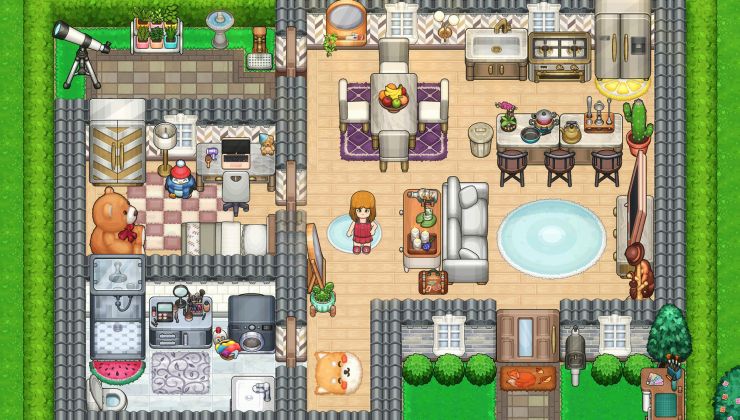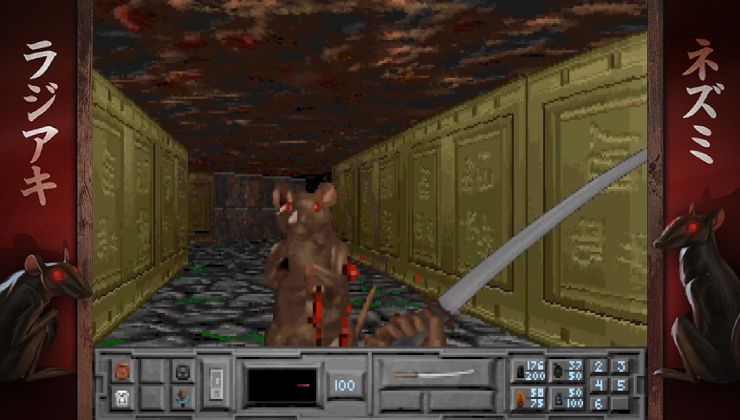Ron Gilbert is a name most in the game industry will know from the likes of Thimbleweed Park, and earlier works like The Cave while at Double Fine and they were even the producer on my all-time favourite RTS Total Annihilation. More than that, Gilbert was also the creator of the classic Monkey Island and it appears they're now attempting to switch to Linux.
Terrible Toybox, the actual team behind Thimbleweed Park are working on a new game and game engine too. They released Delores: A Thimbleweed Park Mini-Adventure in May 2020, as a small standalone title that acts as a prototype for their newer game engine. They even put up the source code for the Delores game on GitHub, although it's not under an open source license. It doesn't support Linux yet but that appears to be planned.
So what's the fuss about? They're switching their development flow to Linux and they've started blogging about the adventure too with a first post about their new hardware a few days ago. Seems they've settled on a Dell XPS 13 with Ubuntu Budgie. The question is: why are they doing it? As they said in the post:
My goal is to see how far I can get developing my new game on directly on Linux and not the Mac (I haven't developed on Windows in years). Can I ditch the Mac and go 100% Linux?
For working on the "game", this shouldn't be a problem once the engine runs on Linux. The few custom tools I use (Wimpy, for example) and all built from the same code the engine is, so once it's working under Linux, they should compile as well.
It's quite interesting to see more developers try out Linux, although not too surprising with how Apple is now again moving CPU architecture. Not just that though, as Apple have been getting more hostile for indie developers, with all sorts of extras being needed now and that's on top of the "Apple tax" that forces you onto their hardware. Gilbert mentioned this as well, with Apple being 'more paranoid and authoritarian' as time goes on.
Since their initial blog post it seems it went mostly okay, and they're continuing to learn and find the software they want. Will be fun to see how it all goes. Good luck, we're here if you need us Mr Gilbert and our Forum is always open. We're always happy to help game developers on Linux.
we're here if you need us Mr Gilbert and our Forum is always open
Oh yes! Please feel free to ask about anything and everything Mr. Ron Gilbert! You have provided us unforgettable life content
(i'm sure he knows about GOL!?)
why does he need a new engine? just use godotI like Godot but it's not the answer to everything and it doesn't fit everyone's needs. Why does anyone make their own stuff? To learn, to have full control and know exactly what it's doing. Just telling a developer to "use x game engine" isn't particularly helpful.
I've been tinkering with getting a (used) Mac recently so that when I make some of my Game Jam games, I can test and release them on Mac... but if Apple is going to have me jumping through hoops just to get a program released on their system, I'm wondering if I should even bother investing.
The fact we are starting to see Mac refugees on Linux means something truly terrible have happened there. Normally that crowd would swear by MacOS.
As cool as this news is, my take away is more an interest in what's happening with MacOS development?!Apple has always been very restrictive. Demanding apps to be signed with certificates that you have to pay for, banning apps from the AppStore if they deem them to be competing with Apples' own products, not allowing other browser engines in iOS, and so on and so forth. Add to that them generally not caring about gaming by having crappy outdated OpenGL drivers, not supporting Vulkan, and instead pushing their proprietary Metal API, then dropping 32-bit support.
Building software in any professional capacity is a pain, because you are not allowed to run macOS on a virtual machine. You instead need Mac hardware to do any sort of continuous integration and automated testing. Except Apple do not make servers, so you have to buy some overpriced desktop machine, or an underpowered Mac mini that you stuff somewhere in the corner of your server room while trying not to trip over it.
And of course don't forget that you will need to equip your developers with MacBooks or iMacs that will set you back thousands of dollars. And they will still need their Windows machines.
With Linux, you just install it and run it.
They do lots of questionable things, but they currently have the only useable phone platform which strives to respect their users’ privacy. Take a look at the recent buzz around the new iOS version finding out all the apps that have been accessing people’s clipboards and cameras behind their backs. I’m sure the same apps do the exact same thing on Android but there’s nothing to notify you about it there. I guess Apple’s overpriced products don’t push them towards trying to monetise their users’ info or something.
Anyway, this is an interesting development. I wonder if Mr Gilbert manages to make it work for him.
why does he need a new engine? just use godotI like Godot but it's not the answer to everything and it doesn't fit everyone's needs. Why does anyone make their own stuff? To learn, to have full control and know exactly what it's doing. Just telling a developer to "use x game engine" isn't particularly helpful.
why does he need a new engine? just use godot
One engine does not rule them all.
Their existing tooling, setup, asset management, etc, would have to change to use a different engine, and that can be quite a hefty bit of work - if the engine is even suitable for what kind of game they want to make.
yeah i know, but his games arent really that complex
i understand it for cyberpunk or other huge open world games, but a pixel style point and click.... i dont know... doesnt seem to by very economically
The fact we are starting to see Mac refugees on Linux means something truly terrible have happened there. Normally that crowd would swear by MacOS.As cool as this news is, my take away is more an interest in what's happening with MacOS development?!Apple has always been very restrictive. Demanding apps to be signed with certificates that you have to pay for, banning apps from the AppStore if they deem them to be competing with Apples' own products, not allowing other browser engines in iOS, and so on and so forth. Add to that them generally not caring about gaming by having crappy outdated OpenGL drivers, not supporting Vulkan, and instead pushing their proprietary Metal API, then dropping 32-bit support.
Building software in any professional capacity is a pain, because you are not allowed to run macOS on a virtual machine. You instead need Mac hardware to do any sort of continuous integration and automated testing. Except Apple do not make servers, so you have to buy some overpriced desktop machine, or an underpowered Mac mini that you stuff somewhere in the corner of your server room while trying not to trip over it.
And of course don't forget that you will need to equip your developers with MacBooks or iMacs that will set you back thousands of dollars. And they will still need their Windows machines.
With Linux, you just install it and run it.
There are few options for mac rentals and virtual OSX, though:
https://www.macincloud.com/
https://www.hostmyapple.com/
I agree with you with all the other things.
yeah i know, but his games arent really that complexLook at it from the other side. For someone developing many different styles of game, gaining some knowledge of, and competence in, a general-purpose engine like Godot, Unity, or Unreal makes a lot of sense. But they're jacks of all trades. If you're sticking to one style, the knowledge and control of the codebase a custom engine gives you tends to outweigh the flexibility of a general-purpose one. And because the games aren't that complex, it isn't too hard to do. (It's beyond me, but if you know what you're doing...) I've seen single-person studios making point-and-click adventures in their own engines.
i understand it for cyberpunk or other huge open world games, but a pixel style point and click.... i dont know... doesnt seem to by very economically
Apple is moving to Arm with their computers, this may have something to do with all this.
They do lots of questionable things, but they currently have the only useable phone platform which strives to respect their users’ privacy. Take a look at the recent buzz around the new iOS version finding out all the apps that have been accessing people’s clipboards and cameras behind their backs. I’m sure the same apps do the exact same thing on Android but there’s nothing to notify you about it there. I guess Apple’s overpriced products don’t push them towards trying to monetise their users’ info or something.
Anyway, this is an interesting development. I wonder if Mr Gilbert manages to make it work for him.
Sorry but you're so wrong, Apple is like the others, and of course gather personal data too.
Don't forget Apple participated in the NSA global surveillance program PRISM, we can't trust them, I don't trust them and you shouldn't.
But about to know "what do these apps on my phone" is an important thing, and speaking of Android there are guys out there who are working on it.
I highly recommend you [Exodus Privacy](https://exodus-privacy.eu.org/en/).
Exodus Privacy is a French (1901 law) non-profit organization. This organization is managed by hacktivists who want to protect privacy everywhere.
And about Apple:
What about iOS apps?So I repeat, we can't trust Apple.
Apple’s DRMs strictly forbid us to investigate so we can not say. However, the applications of both OS are often made by the same teams/agencies and the trackers’ SDKs are often available for both Android and iOS. The suspicions are therefore strong that the trackers of one are also in the other.
It always bothered me about Debian that they have a "Don't break Debian" policy in the background. Why not? Breaking Linux and learning how to fix what I broke has gotten me more involved than I ever was in Windows. If I mistype something in /etc/fstab, it's my mistake to fix. I would hope that developers are always seeking to find the game engine that suits their needs best while giving them the required openness about bugs they encounter so they don't have to search through 12.000 lines of code just to find the missing ;...why does he need a new engine? just use godotI like Godot but it's not the answer to everything and it doesn't fit everyone's needs. Why does anyone make their own stuff? To learn, to have full control and know exactly what it's doing. Just telling a developer to "use x game engine" isn't particularly helpful.
As a game developer in a AAA games company, and although we have our own game engines, I am still not convinced that doing your own game engine is a good thing. Game engines have become beasts, it is not just a matter of graphics, it is also about sound, AI, inputs, physics, animation, data management, etc.. and, on top of that, a whole editor for the game devs and artists to integrate their stuff in the engine. That why it is preferable to talk about "game editor" rather than "game engine". The engine is just a small part of the whole piece.yeah i know, but his games arent really that complexLook at it from the other side. For someone developing many different styles of game, gaining some knowledge of, and competence in, a general-purpose engine like Godot, Unity, or Unreal makes a lot of sense. But they're jacks of all trades. If you're sticking to one style, the knowledge and control of the codebase a custom engine gives you tends to outweigh the flexibility of a general-purpose one. And because the games aren't that complex, it isn't too hard to do. (It's beyond me, but if you know what you're doing...) I've seen single-person studios making point-and-click adventures in their own engines.
i understand it for cyberpunk or other huge open world games, but a pixel style point and click.... i dont know... doesnt seem to by very economically
Developing these kind of game editors cost millions of dollars a year and it is, of course, never finished. On the other side, if you choose to use an existing game editor (Unity, Unreal, Godot, ...), you get all the new fancy features with each upgrade and you can focus only on what's important: your game.
As a developer, I understand the urge to own and control your own code but, to make a poor analogy, developing your own game editor to make your game is a bit like developing your own Photoshop to create your textures.
Edit:
I would add that open source is, to me, the perfect compromise. You don't have to develop everything just by yourself, but you still have control over the code. When Godot will get to a point where it would compete with Unity and Unreal, I think this will be a game changer (pardon the pun
Last edited by Creak on 27 Jul 2020 at 6:37 pm UTC
As a game developer in a AAA games company, and although we have our own game engines, I am still not convinced that doing your own game engine is a good thing. Game engines have become beasts, it is not just a matter of graphics, it is also about sound, AI, inputs, physics, animation, data management, etc.. and, on top of that, a whole editor for the game devs and artists to integrate their stuff in the engine. That why it is preferable to talk about "game editor" rather than "game engine". The engine is just a small part of the whole piece.Yes, I understand that, but you're doing AAA. As I said, for small-scale developers doing a particular style of simple game (I've seen indie point-and-clicks come in at under 300Mb, and there's really not a lot going on in these things; they're rarely even properly realtime), it probably does still make sense. The amount of time you spend wrestling a general-purpose engine/editor into working in your style might as well be spent writing one from scratch. Or almost from scratch. Something like SDL can handle the low-level stuff.
That goes double if you already have one, which is what it sounds like with Gilbert/TT. Sure, there's going to be maintenance required, but again: simple games, simple engine.
As a developer, I understand the urge to own and control your own code but, to make a poor analogy, developing your own game editor to make your game is a bit like developing your own Photoshop to create your textures.Great analogy, actually. If you're doing fixed-palette pixel art, Photoshop is overkill. I don't know if Gilbert does, but in principle it's the same idea: You've already decided that you aren't trying to keep up with modern trends, so as long as your simple in-house tools still work, why change?
What are the Linux alternatives to Apple's Xcode? Last time I used it, was easy and fast to use - with incredible search capabilities. (This was years ago in Tiger.) I can't really find a comparable IDE for Linux.Have you looked at [JetBrains products](https://www.jetbrains.com/products.html#type=ide)? [AppCode](https://www.jetbrains.com/objc/) is probably the closest thing.













 How to set, change and reset your SteamOS / Steam Deck desktop sudo password
How to set, change and reset your SteamOS / Steam Deck desktop sudo password How to set up Decky Loader on Steam Deck / SteamOS for easy plugins
How to set up Decky Loader on Steam Deck / SteamOS for easy plugins
See more from me